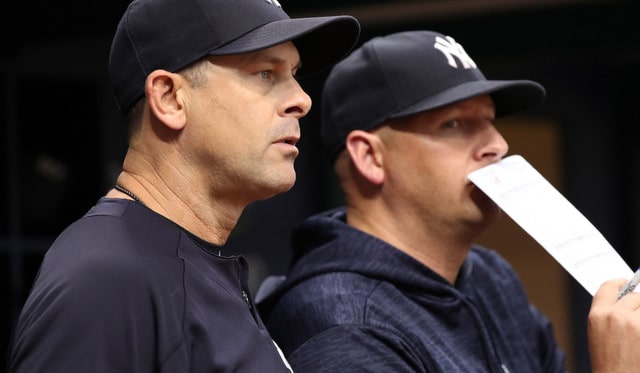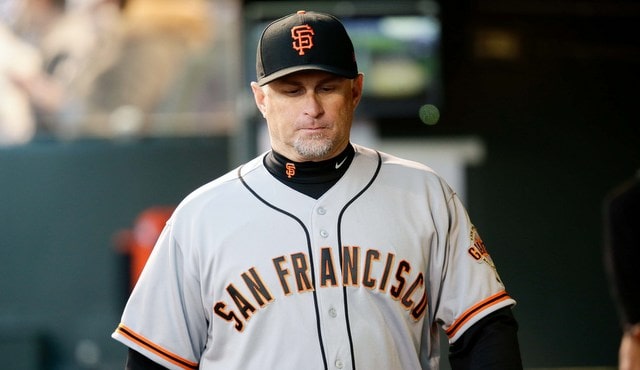
Overall, Aaron Boone’s first season as Yankees manager was a success. The ending was disappointing, there’s no doubt about that, but the club won 100 games despite injuries (Aaron Judge) and unforeseen performance issues (Gary Sanchez), and the Yankees seamlessly broke in high-end youngsters like Miguel Andujar and Gleyber Torres. I think we all would’ve signed up for that at this time last year.
Boone’s on-field managerial style was very similar to Joe Girardi’s. He built his lineups the same way, meaning he sandwiched a lefty between his big righty bats (or vice versa) even though the off-hand player’s production suggested it wasn’t the best idea. He employed set bullpen roles and also rested his players on a schedule no matter what they did the day before. Everything we complained about with Boone we also complained about with Girardi.
Brian Cashman and Hal Steinbrenner indicated the managerial change was made for communication reasons and, as outsiders, there’s really no way we can evaluate that. Boone is much better with the media than Girardi, which is not nothing, but it’s not what Cashman and Hal meant by communication either. They meant the behind the scenes work, including digesting and disseminating information provided by the front office.
As the Yankees prepare to begin the 2019 regular season, Boone no longer qualifies as a rookie manager but he’s not a grizzled veteran either. At the very least, nothing will be new to him. He’d been through Spring Training already, been through the grind of the regular season, and been through the postseason as well. Last year was the first time for everything. That isn’t the case now. Let’s preview the upcoming season to come in the dugout.
The Second Year Manager
The last time we saw the Yankees and Boone, he mismanaged the bullpen and the pitching staff in general to an embarrassing ALDS defeat. Starters were repeatedly left in too long and relievers were brought into situations that did not match their skill sets (Lance Lynn with the bases loaded and no outs? really???). There’s a pretty good chance the Yankees lose the ALDS anyway even with perfect managerial moves, but Boone was no help, and his moves left a real bad taste in everyone’s mouth.
“I hate to be too generic, but everything,” said Boone at the Winter Meetings when asked what he wants to do better going forward. “And I don’t know it’s so much self-evaluating as you go through the winter, every day is an evaluation. Every day you come in during the season, whether you won, whether you lost, whether a move worked out, you know, a decision made, hopefully you’re always taking stock of those things and evaluating, and putting into your experience and learning from it.”
Learning from those ALDS mistakes is imperative. We just won’t know whether it actually happened for a few months. Managing the pitching staff during the regular season is way different than managing the pitching staff during the postseason. Quick hooks and heavy bullpen usage works in October but not April through September. That’s a good way to burn everyone out during the summer. The regular season is a marathon, the postseason is a sprint, and they require different managerial styles.
“I think at times some of the (unpredictable) things that come across the desk almost on a daily basis, from minor things to things that are more serious, and how you handle those,” said Boone when asked what the biggest challenge was last season. “You never know how you’re going to handle those. And that’s a challenge. You’re never totally prepared, I guess, for all the different things that do come across on a daily basis. So I would say that’s the biggest challenge, the unknown of what’s around the corner … Things come up all the time that you’ve got to deal with in real time. That’s a challenge.”
I thought Boone was very good during the regular season. His on-field moves were almost indistinguishable from Girardi’s. They were so similar that I have to believe the front office has a lot of input into the day-to-day decisions. In the postseason though, Boone’s perceived inability to read the situation and react accordingly was impossible to ignore. It could be a learning experience and he’ll be better going forward, or it could be a sign his feel for the game is questionable.
As best I can tell, the players love Boone and the front office loves the way he and his coaches take the information they’re given and put it into practice. That was Girardi’s problem, apparently. With Boone, it seems everything went well in year one, and I bet things will go even better in year two now that he has some experience. What happens in the postseason? Who knows. That is a long way off, and yet it seems to be the only thing on everyone’s mind.
“As I sit here today, basically a little bit over a year after I was hired, and being at the Winter Meetings, last year I was learning people in the room’s names and what they did, and what are their values, who are they, how does this all work, who’s got a loud voice in the room, those kind of things. I have relationships with all these people now,” Boone added. “So hopefully I’m so much ahead of the game from where I was last year and hopefully we hit the ground running.”
The Same Ol’ Coaching Staff

For only the second time in the last six offseasons, the Yankees did not make a single change to their coaching staff over the winter. Larry Rothschild returns for his ninth season as pitching coach, Mike Harkey is back for his fourth straight year (and tenth overall) as bullpen coach, and everyone else is back for year two. That includes bench coach Josh Bard, first base coach Reggie Willits, third base coach Phil Nevin, hitting coach Marcus Thames, assistant hitting coach P.J. Pilittere, and quality control/infield coach Carlos Mendoza.
There’s no good way to preview a coaching staff so I’m going to list some scattered thoughts instead. One, I’m curious to see what the Yankees and Rothschild have planned for James Paxton. He has a great fastball and he uses it a lot, but his curveball and cutter are pretty good too, so it seems like the potential for improvement with better pitch selection exists. The Mariners have no idea what they’re doing and I’m certain the Yankees acquired Paxton with the idea that they can help him be even better going forward. (Similarly, are any adjustments in the cards for J.A. Happ as he gets up there in age, especially if his fastball continues to lose spin?)
Two, will Nevin be any more aggressive or conservative sending runners? The Yankees were almost perfectly average across the board last year in terms of sending runners home. On one hand, you could argue Nevin should be more conservative going forward because the Yankees have so much power that they shouldn’t risk baserunners. On the other hand, there are bound to be times increased aggression would be worthwhile. It really depends on the situation. I think we might see runners held at tad more going forward.
And three, how much will the defense improve? Specifically Miguel Andujar at third base and Giancarlo Stanton in left field. Mendoza and Andujar work tirelessly on his third base defense. Stanton was much better in left as the season went on but there’s some room for improvement there. Giancarlo in left is a project for Willits. Ultimately, it’s up to the player to improve. Coaching only goes so far. That said, the coaches get praise and receive blame, so Andujar and Stanton will reflect on Mendoza and Willits.
It is basically impossible to evaluate coaches from the outside, so we wind up projecting player performance on to the coaching staff. Talent is the single most important thing and the Yankees have lots of it. They’re going to make the coaches look good. Boone could’ve used his talent better in the postseason last year, and I’m sure there are ways Rothschild, Thames, and the other coaches could help their players get more out of their ability. Seeing how (or if) it happens is part of the fun.





